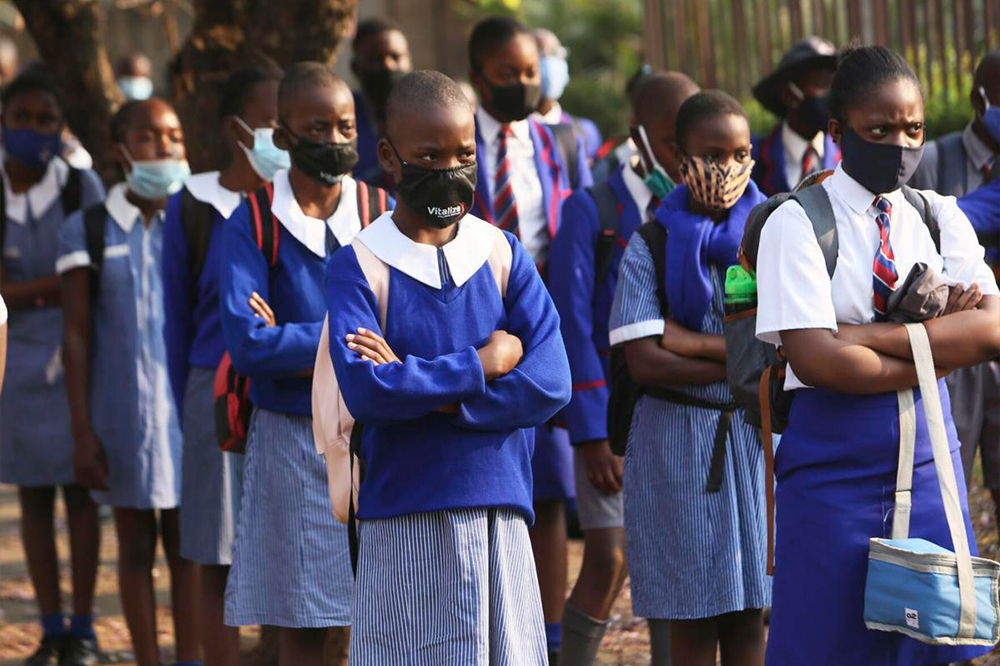REPORT WITH US
WhatsApp: +263 7 18636459
Email: editor@thecitizenbulletin.com
Twitter: @TheCB_News
Facebook: The Citizen Bulletin
“More Local, More Inclusive, More Interactive"

Schoos have begun to gradually reopen in Zimbabwe. Image by Farai Mutsaka | Associated Press
EDITORIAL | @The_CBNews | This email address is being protected from spambots. You need JavaScript enabled to view it. | OCT 2, 2020
In Zimbabwe, schools have reopened but what is worrying is that most parents whose sources of income were decimated by the coronavirus pandemic have no alternative ways of raising the money required by schools upfront before children are allowed to resume their studies or even sit for exams. While the resumption of the school calendar has divided opinion regarding the health safety of children from COVID-19, perhaps for the majority of parents the most pressing question is: Who will pay the bill?
BULAWAYO — With a significant drop in the COVID-19 transmission rate in the country, the decision to reopen schools appears to be most reasonable. But while cases of infections are declining, the country’s economy is deteriorating; businesses are going under the bus; a liquidity crisis ails the entire marketplace; and people are facing a financial crunch like never before.
Amid all this, government authorities have allowed a phased reopening of schools from late September to early November. In such a scenario, an important question comes to the light: who will pay the bill? In our lead story, we highlight how the reopening of schools has triggered a fresh headache for parents, many of whom are already struggling to make ends meet due to the economic impact of the coronavirus pandemic.
It is ironic that while focus is directed on the readiness of schools to deal with the virus, the ability of parents to meet increasing tuition and boarding fees remains an ignored concern. We contend that both public and private schools must be lenient and allow pupils, especially those that are sitting for exams, to attend classes whether they have paid tuition or not. Although government authorities insist that schools must not expel non paying pupils, we urge them to bail out parents who are struggling to raise money to pay school fees through bursaries paid directly to schools.
As the country continues to fight the coronavirus, we’re dismayed that in Lupane, Matabeleland North, there are no funds to finance an effective local COVID-19 response program, yet the district is endowed with abundant natural resources such as timber and methane gas worth millions of dollars. These resources could help drive local development and equip health centres with medication and other necessities. We hope that the devolution policy that has recently been gazetted will expedite processes to ensure that local communities benefit from natural resources in their vicinity.
In Victoria Falls and Hwange, the coronavirus has surfaced a housing backlog dating several years back. Housing woes are not only peculiar to these areas. In many parts of Matabeleland, many people are without proper housing, several decades after independence. We therefore find it pretentious for authorities to claim progress in housing development when many citizens are living in squalid conditions. In the absence of urgency from the current government administration, we urge locals to join legit cooperatives where they are likely to secure housing speedily than rely on false promises from politicians who only come seasonally to canvass for votes.
Meanwhile, while the coronavirus continues to worsen existing challenges for key populations, the disabled are hit particularly hard. In Hwange’s Cinderella area, residents use common ablution facilities that increase their risk of contracting coronavirus and other diseases. To compound matters, the toilets they use don’t have ramps and balancing pillars for people with disabilities. And we dare ask: Where is the social welfare department?
While we’re aware this is not a new issue, we believe the local social welfare office has the responsibility of ensuring that key populations are taken care of, and their unique needs are met. The coronavirus pandemic presents an opportunity for government departments to address many problems they have long ignored, and this includes ensuring that existing infrastructure is remodelled to be user-friendly to people with disabilities.
ALSO READ: Fresh Headache for Parents As Schools Reopen Amid COVID-19
As we continue to bring you hard-hitting coronavirus reporting, we invite you to engage us, and share with us issues that you’d want us to report on. Our news outlet is built on a foundation of listening, and as such, constantly hearing from our audiences gives us the urge to do our work effectively. We hope you will enjoy our bi-weekly newsletter and podcast, and share with everyone who cares about local issues.
Yours Sincerely,
The Citizen Bulletin
Editorial Team
This website uses cookies that are necessary to its functioning and required to achieve the purposes illustrated in the privacy policy. By accepting this OR scrolling this page OR continuing to browse, you agree to our privacy policy.